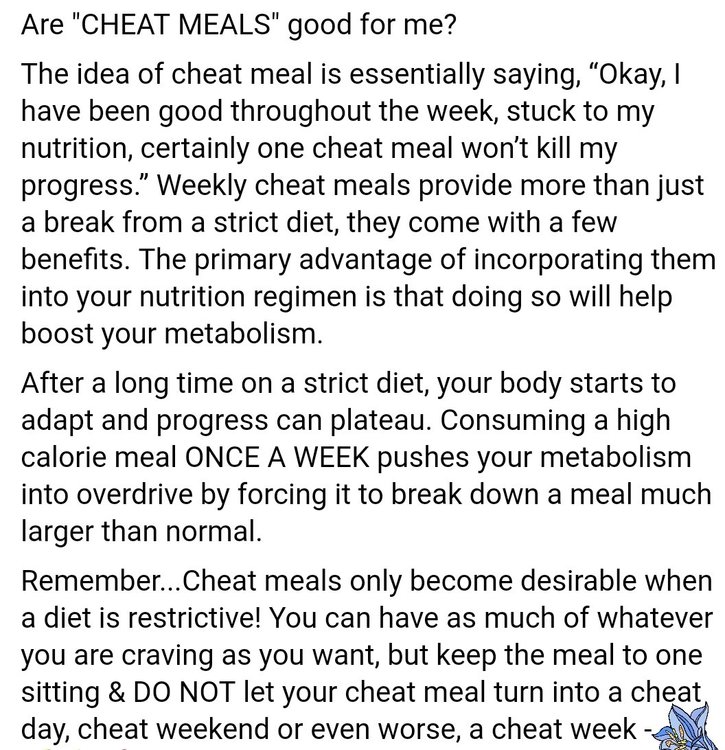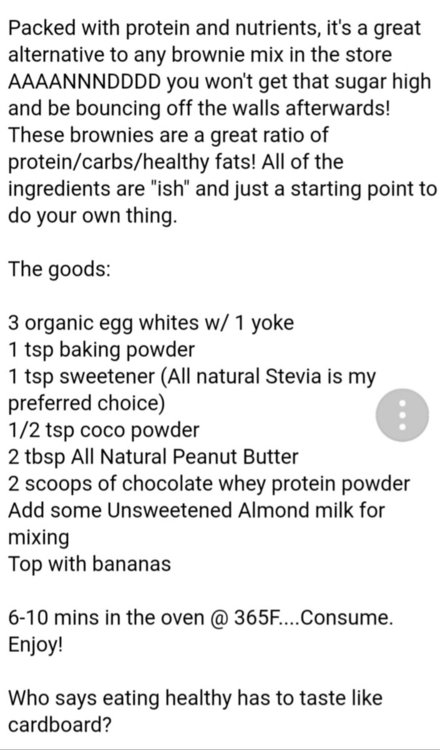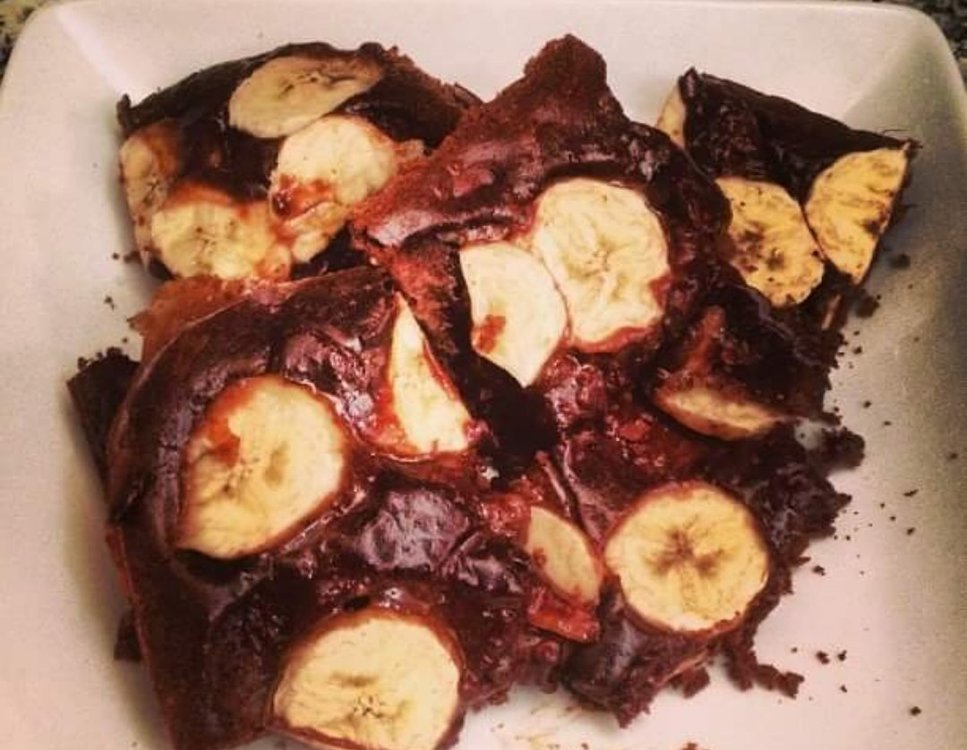Leaderboard
Popular Content
Showing content with the highest reputation on 09/19/2018 in all areas
-
So today was my first workout A1 It takes a lot out of you!!! Holy shite! The first two exercises you are going all rawr on trying to lift like a mother@#$#@, but then when I got to dips I couldn't believe how fatigued my triceps were and completing a few sets really went to failure quick (and my definition of failure is when unable to complete a lift with correct form). By the time I got to doing barbell rows I was actually thankful they were just straight sets instead of the rest pause failure set. The stretching hurts...a lot...but it's a good feeling. Today was a success for day 1, and on wednesday I will start my B1 program. Onward and upward!4 points
-
To me the rowing machine is the best for fat burning activating the most number of muscles legs arms back. This is just my personal experience what I find works for me. If you hate your cardio you won’t do it. Find what works for you and run with it. Does it matter if stair climber is the best for fat loss but you dread doing it? just my .022 points
-
NUTRITION AND SPECIAL DIETS Nutrition is an extremely complex science that deals with a system so intricate that it is oft difficult to fathom. Our bodies require many different things from the food we eat and we need the specific sustenance they offer in varying quantities and forms. One of the largest factors in determining the right diet is your own health and wellbeing. Certain problems present specific challenges that may alter the foods you can and should consume. To explain the way in which these conditions relate to your daily intake, we have compiled a list of resources written to assist anyone with a condition that significantly affects their lifestyle. Whether you are simply suffering from a deficiency or a surplus of a particular nutrient or you have a clinical condition that demands an entirely distinctive diet- Here are some example diets:: 21 Day Fix » While eating healthy varies from person to person, there are a wide variety of diets that claim to offer a one-size-fits-all approach to becoming a leaner, healthier you. The 21 Day Fix is a diet and exercise program aimed at helping anyone lose weight. Learn more about this program here! 5 Popular Diet Similarities » There are a large number of diets that vie for our attention, and while some include specific considerations for those with particular needs- most diets have a few central ideas in common. Discover the heart of healthy eating with these 5 ubiquitous aspects of a wholesome diet. Alkaline Diet » The alkaline diet emphasizes controlling your body’s pH through the foods you eat. Proponents of this diet believe that acidic foods can do serious damage to your body and can lead to chronic illnesses and conditions. Learn which foods are alkaline and which are acidic here. Anti-Inflammatory Diet » Inflammation is a natural process that is necessary to our body’s healthy function. However, when this process occurs in excess, it can also contribute to a myriad of chronic health problems. The foods we eat can impact the body’s inflammatory response, and an anti-inflammatory diet aims to do just that. Discover the top foods to eat to mitigate the harmful effects of inflammation and which inflammatory foods to avoid here. Calorie Counting » It seems simple: less calories in than calories out results in weight loss. But, there are plenty of factors that influence the amount of calories your body needs- and ignoring these dietary aspects can result in disaster. Learn everything you need to know about calorie counting for weight loss here. Carb Cycling Diet » What is carb cycling and does it work? Learn all about this new diet and the ways in which bodybuilders are hoping to attain a fit physique by altering their carb consumption on a day-to-day basis with this informative guide to a carb cycling diet. Celiac Disease » Celiac disease affects the body’s ability to metabolize gluten, which can severely impact the diet of those afflicted by the condition. Because it is quite rare, it often goes undiagnosed or misdiagnosed in those who suffer from its maleffects. Learn more about the disease, including ways to maintain your health while living with the disorder, here. Cholesterol » Cholesterol comes with serious consequences to your cardiovascular system; but, there are both good and bad forms of the substance. In fact, this chemical is essential to your well-being. Both good and bad kinds of cholesterol can be found in a wide variety of foods, so how do you know which to eat and which to avoid? Learn all about the different types of cholesterol, the foods that contain them, and how you can keep a healthy cholesterol level here. Clean Eating » Clean eating is a lifestyle of healthy eating that involves forsaking the artificial. Unlike other diets, this entails checking not only the content of your food, but the source from which it comes and the methods used to prepare it. Learn all about the potential health benefits of this habitual hunt for natural foods and how you can get clean today. Crohn's Disease » Crohn’s disease is a form of inflammatory bowel disease that can seriously damage the gastrointestinal system. Though little is understood about the condition, there are ways to mitigate its effects. Learn how making certain dietary changes may improve the condition of those living with the condition here. DASH Diet » The DASH diet is a specialized plan for those suffering from or at risk for hypertension. Lowering your blood pressure can also help reduce the risk of developing chronic disease. Learn all about the DASH diet and improve your eating habits and blood pressure levels today! Detox Diet » Detox diets are popular, usually short-term, methods of trying to cleanse the body. Depending on the specific diet, your detox diet may purport to aid in weight loss, remove toxins from the body, or otherwise counteract the effects of toxic chemicals. But how effective are detox diets really? Learn all about these fad diets and how they function here. Diabetes » Diabetes can be a debilitating condition and may significantly alter your lifestyle; two forms of the disease exist and each offers its own limitations. Learn all about both forms of the disease and how you can protect yourself from its ill-effects with healthy meals and recipes selected specifically to address its symptoms. Diabetes Diet » A healthy diabetes diet is similar to many other healthy, well-rounded diets. Learn the basics of eating with diabetes mellitus, including food recommendations from a Registered Dietitian, here at Nuts.com. Diet Pill Dangers » Losing weight can appear an onerous endeavor to many; and, when faced with the need to slim down, many find the promise of fast and easy weight loss as a beautiful gift from above. But, as appealing as they are, diet pills and those who promote them may prove to be more capricious than benevolent. Learn the truth about different diet pills and the promises they make, and discover safe and healthy alternatives here. Fat Burning Foods » Losing weight is already a difficult endeavor for many and focusing on “problem areas” can prove even more arduous. The right diet, however, can stimulate your body to metabolize fat and help keep you lean and toned in your efforts to stay healthy. Learn which foods facilitate fat burning and how to add them to your diet here. Gluten-free Diet » Gluten is a protein commonly found in grain-based products that can really irritate the digestive system of a select portion of the population. As such, many Americans are electing to avoid this problematic protein altogether. Learn more about gluten, the problems that it causes, the foods that contain it, and the best ways to stay gluten-free here at Nuts.com. Glycemic Index » Many know that the glycemic index is a popular tool for those that need help regulating their blood sugar levels; but, how does the index actually work? Learn what glycemic index values actually mean and how to use these numbers to effectively control your glucose levels throughout the day. Heart Health » Be kind to your heart with these cardiovascular-friendly foods. These healthy snacks contain key nutrients like antioxidants and potassium, which are geared to support your heart. High Blood Pressure Diet » Hypertension is a dangerous medical condition that can significantly increase risk for chronic disease. Certain dietary changes can help assuage the condition and may facilitate additional changes to support overall health. Learn the foods that contribute to a hypertensive state and what you can do to lower your blood pressure naturally. High Fiber Foods » Fiber is an important part of any diet and many don’t eat enough of it. Learn all about this essential nutrient and the foods that contain it, and find the best sources of fiber to add to any diet here. How to Eat Healthy » Not sure where to start with your endeavor to eat healthy? Check out our advice for those that aim to improve their dietary habits complete with tips to sticking to your goals, easy recipes, and scrumptious ready-made snacks! How to Lower Blood Pressure » Learn the key ways you can change your day to day lifestyle to lower your blood pressure level. A healthy blood pressure level can protect you against chronic disease and other dangers. Hypertension » Hypertension, or abnormally high blood pressure, can lead to a myriad of health problems, including heart attack and stroke. Learn about the dangers hypertensive disorder poses and how you can reduce your risk for developing hypertension or for facilitating the severity of the condition. IBS Diet » Irritable Bowel Syndrome, or IBS, afflicts more than 10% of the population. Though symptoms vary, diet can exacerbate symptoms associated with the reactions caused by the condition. Controlling your diet and lifestyle can help offer much needed relief to those suffering from the condition. Learn more here. Ketogenic Diet » The ketogenic diet attempts to induce ketosis to facilitate fat burning and to encourage healthy weight loss and improved health. But does it work? Learn all about this trending topic and the merits behind its innovative ideas with this exploration into the ketogenic diet and its efficacy. Liquid Diet » The liquid diet is a means of accommodating those with certain restrictions as they recover from select medical conditions. There are variations of the diet that accommodate different medical needs, and you can learn more about each of these varieties here. Low GI Foods » The glycemic index was created to help create an awareness of the impact select foods will have on blood sugar levels. An essential tool for diabetics, the glycemic index allows us to focus our diet on low glycemic foods that will keep our blood sugar at a manageable level. Discover delicious low GI foods to help you care for your body with these simple meal suggestions! Low-Carb Diet and Foods » Learn about how to adhere to a low-carb diet and how to reduce your carb intake at Nuts.com. We even have food recommendations from a Registered Dietitian! Low-Fat High-Carb Diet » Cutting carbs is all the rage with countless diets advocating a cessation to carb consumption as a one-size-fits all solution to our ails. But, a new diet claims that consuming more carbohydrates may in fact be the answer. Learn all about the low-fat, high-carb diet here at Nuts.com. Mediterranean Diet » Discover our Mediterranean Diet recipes and snacks and learn all about this lifestyle and its innumerable health benefits. Mediterranean Diet Foods » The Mediterranean Diet is more than a fad, with several scientific studies citing it as the healthiest diet around. Discover our favorite staples of the diet to have on hand with this simple list! Military Diet » The military diet is a strategy for weight loss that may seem incredibly appealing, but is the diet all its cracked up to be? The diet promises weight loss of up to 10 pounds without sacrificing their favorite foods. Learn all about this diet and how it works here. Nutrition Labels Explained » For those that aim to eat healthy, the nutrition labels of a food can be an invaluable tool. But, this curious codex can often keep the true nutritive value (or lack thereof) completely obscured behind an amalgam of percentages, schemes, and jargon. Commit these simple tips to memory to ensure that you consistently select the best foods to meet your dietary needs. Paleo Diet » Trying to lose weight? Pursuing a diet that supports the clean eating lifestyle? Wary of antinutrients and the overwhelming caloric value of carbs? Perhaps the paleo diet is right for you. Learn more about this scientifically supported means of losing weight here. Raw Food Diet » There’s no doubt about it: when you cook your food, you alter it at a molecular level. Many believe these changes are detrimental to the offerings of select foods, and prefer a diet that evades all forms of processing to pursue the pure nutritive value of everything that passes through their lips. This diet, also known as the raw diet, is difficult to maintain- but is it worth it? Learn more here. Superfoods » Let’s face it: not all foods were created equal. If you’re finding it difficult to meet your nutritional needs then we have a pleasant surprise for you: there are some nutriments that offer monumental amounts of nutrients to help round out your diet with just a few simple steps. Learn all about these brilliantly beneficial superfoods and the sustenance they supply here. Sustainable Weight Loss » Looking ot lose weight? There are countless diets that offer supposed solutions to shirking that surplus body fat, but some supply weight loss solutions that are more sustainable than others. Discover the best ways to shed those pounds and keep them off with these considerations for the best sustainable weight loss diets known today. Thrive Diet » Searching for a way to boost your energy levels while reducing your stress levels and improving your overall health? The Thrive diet aims to accomplish this and more with a vegan program developed by Ironman athlete and Vega product developer, Brendan Brazier. Learn more about the diet and if it can help you meet your goals here. Vegan Diet » One of the most strict diets around is also one of the most rewarding. Practicing vegans forego all manners of animal products, including many you may find surprising. Learn about the ethos, the logos, and the logistics of the vegan lifestyle here. Vegetarian Diet » Foregoing all manners of meats is a worthy feat, but a strict restriction on your diet can cause certain difficulties. There are many variations of the diet, each of which offers its own practical or ethical explanations. Learn all about this lifestyle, its growing popularity, and how you can develop healthy vegetarian habits. Weight Loss Shakes » Creating shakes with the nutrients of a typical meal can produce a healthy way to stimulate your metabolism while restricting your daily calorie count. Learn all about this efficacious weight loss strategy and how it can help you meet your goals. Whole30 » The Whole30 Program is a temporary diet that is designed to change the way you eat forever. Learn how this diet utilizes on simple concept to identify the foods that are right for you with this basic guide to the Whole30 diet.1 point
-
Playing with things now but am starting a new log Will be running proviron eq test and hgh Im going to run staright BT labs and will be working with funny man on training. Im curretbly 204 pounds 5 ft 9 and about 10% bf Stay tuned before and after photos comming soon1 point
-
Today is the first day of my offseason training. Since my show in June, i've been going at a pace where I can say it's just to maintain, just getting into the gym, trying different things out, but eventually burned out from never taking a break. I took a full 2 weeks off in August and started back up two weeks ago with renewed focus, getting the kinks out of my muscles for soreness, and now I started my approach over the next 12 weeks. I am doing Doggcrapp (DC) training. I have my three upper body, and lower body days labelled below as a start - and as I tinker with how my body feels I will adapt and replace exercises to become stronger and to stimulate more as needed. I expect to have failures, success, shitty training days, great training days, days where i'm in limbo. I will update the log as I do my days and thoughts and feelings and hope you guys go along for the ride. Currently sitting at 225 lbs; 20 lbs up from stage weight. Lost some mass, have fat on me, but look healthy anyway. Time to get large!! A1 CHEST – Smith Chest press SHOULDERS – Smith Shoulder press TRICEPS – Dips BACK WIDTH – Pulldowns BACK THICK – Barbell rows B1 BICEPS – Ez curl FOREARMS – Hammer curl CALVES – db single leg standing calf press HAMS – prone single leg hamstring curl QUADS - squat A2 CHEST – Hammer strength press SHOULDERS – Hammer strength shoulder press TRICEPS – Close grip bench BACK WIDTH – Pull ups BACK THICK - Deadlifts B2 BICEPS – Preacher curls FOREARMS – Reverse curls CALVES – Seated calf press HAMS – Stiff legged deads QUADS – Smith front squats A3 CHEST - Decline Smith flat press SHOULDERS – Arnold press TRICEPS – Skullcrushers BACK WIDTH – Hammer strength pulldown BACK THICK – TBar rows B3 BICEPS – Seated incline dumbbell curl FOREARMS – Cross over hammer curls (pinwheel) CALVES – Standing smith calf press HAMS – Seated hamstring curl QUADS – Leg press1 point
-
1 point
-
1 point
-
DC training is fucking awesome. Did it for 2 months. Weird working out 3 days a week and only one body part per wo. But with its punishment that’s all that’s required that’s for sure. I’ll be following along man. Keep up the good work Cheers1 point
-
You could probably inject spent uranium and have minimal issues LOL1 point
-
Today was training B1 Jesus mother @#$*()@#$(*)#@ It seems dramatic but this program is absolutely rotten tough. One exercise per body part doesn't seem so damn bad but when you're doing 3 rest pause sets after a proper warm up your brain begins to degrade and it takes a lot of digging to do it again...and again. I got to the squats, did 3 warm up sets...and I thought no effing way am I going to be able to up the weight for my "widow maker" set Widowmaker - after a few warm up sets, you do a 20 rep set, full ass to grass. I got to 17..the pressure was so bad in my low back I thought I was going to snap in two, so I held racked it out of safety. THEN you do the 1 minute hard stretch..OMFG (wasn't so bad with biceps and forearms)..but it felt like my quads were going to rip off my femur. And that was it!! Then right to hamstrings. The workout itself still took a solid 45 mins to get done but the intensity is just that much more jacked up. So now I know for the next time I come around to exercise B1 I will have to increase my reps to the full 20 if i can. Always a progression, and logged in every detail, including how I felt, what was going through my mind, and ways to improve the next time. And now I wait for soreness..fml1 point
-
Just a very interesting article i found hope you enjoy.... Unlike weight training, which involves lifting weight to improve general health and lean muscle mass, bodybuilding is specifically geared toward massive muscle growth with an emphasis on appearance over performance. This emphasis requires athletes in the sport of bodybuilding to retain a lean body that puts the definition of their muscles on display. To this effect, their diet must facilitate fat metabolism. Well, hold on, this means that bodybuilding requires pursuing two contrary goals simultaneously: both increasing and decreasing body mass. In order to accomplish both goals, training is usually parsed into two phases: bulking and cutting. But wait one minute- we all know the feeling of getting stuck in a bulking rut. It's tough to lose fat, and mass doesn't just magically convert to lean muscle. Well, if you find the strict dichotomy of bulk and cut to be a bit suspicious then you're headed in the right direction. Replacing "Bulk & Cut" with a Solution that Works A healthy bodybuilding diet is more nuanced than simply alternating between periods of caloric surplus and caloric defecit. Instead, bodybuilders should focus on utilizing intermittent fasting and specialized nutrition to attain their goals. Right now, you're probably scratching your head wondering how fasting can help you build a muscular physique. Well, I know what you're thinking- doesn't skipping a meal cause your body to cling to your calories as fat? Won't fasting make it harder to build muscle and more difficult to lose fat? Think again. Most anyone who has tried to build muscle knows that your muscles require rest between workouts. While some opt to rotate muscle groups, others take a day between weight lifting sessions to work on cardio and core workouts. We recommend the latter. The reason? Taking designated periods of "rest" allows your body to get in a rhythm that supports the aims of bodybuilding. Fasting during these periods of cardiovascular workouts trains the body to rely on its fat stores for energy. In fact, studies show that fasting on alternating days leads to weight loss in non-obese subjects. What's more is that this weight loss corresponds with increased fat oxidation and reduced fat mass in the body (Heilbronn, Smith, Martin, Anton & Ravussin, 2005). But, How Do Bodybuilders Build Muscle With Fewer Calories? The short answer is: they don't. As stated, bodybuilders need to utilize intermittent fasting and specialized nutrition. On days focused on building muscle, it's essential to provide your body with the proper fuel, which means consuming more calories than the body burns (Lambert, 2004). During most of bodybuilding training, the overriding goal is to stimulate muscle growth. There are two components of muscle growth: stimulation and repair, both of which can be supported and enhanced by the proper diet. Stimulation occurs while training at the gym; repeatedly contracting muscles while under a significant weight load causes muscle fibers to become damaged. During the repair phase, tissue undergoes healing that eventually causes muscle hypertrophy, or growth (Schoenfeld, 2010). Muscle repair depends on the availability of amino acids, which are the building blocks of protein. When you eat protein, your body breaks it down into its components, amino acids. These amino acids are rearranged and built into new proteins that make muscle tissue larger. As a result, protein is the number one concern for bodybuilders looking to increase muscle mass. The specific guidelines for a bodybuilding diet include 55 to 60% of calories from carbohydrates, 25 to 30% from protein, and 15 to 20% from fat (Lambert, 2004). Keep in mind that because fats contain more calories, a relatively smaller amount of high-fat foods are needed to achieve this balance. This diet should remain consistent throughout training with days of intermittent fasting keeping diet composition consistent while reducing caloric intake. In other words, on rest days, eat the same food- but less of it. So, Which Foods Are Best Included in a Successful Bodybuilding Diet? The Academy of Nutrition and Dietetics recommends that bodybuilders eat 1.2 to 1.7 grams of protein per kilogram bodyweight each day (Caspero, 2014). For example, a 190-pound (86 kg) bodybuilder should aim for 103 to 147 grams of protein daily. Lean protein is best, as it contains relatively less saturated fat. Consider the following protein sources for a healthy bodybuilding diet (Utah State University Extension): Chicken breasts (skinless) Ground beef Ground turkey Yellowfin tuna Halibut Salmon Canned tuna Cottage cheese Greek yogurt Sardines Navy beans Mixed nuts Lentils Peanut butter In addition to lean protein, carbohydrates form a critical component of the bodybuilding diet. Carbohydrates are particularly useful immediately following a workout (Helms et al., 2014). This is because during an anaerobic weight training session, the body uses up stores of glycogen to fuel the workout. Eating carbohydrates following a workout replaces this storage form of glucose, aiding recovery. Effective forms of carbohydrates include fruits, oatmeal, pasta, sweet potatoes, corn, peas, or whole-wheat bread. An effective bodybuilding diet typically involves at least five or six small, nutrient-dense meals throughout the day (Helms et al., 2014). This helps to keep energy levels high and allows the body to have enough nutrients to repair damaged muscle tissue. To fast effectively, we recommend eating your last meal a few hours before bed and skipping the first meal of the day until your cardio workout is completed. Remember, for fasting to be an effective strategy, this meal cannotbe substituted with more meals or larger portions later in the day. Wait! Stay Safe When Building Muscle By Ensuring the Nutritional Adequacy of Meals Although a bodybuilding diet can be healthy, many athletes focus on muscle growth to the exclusion of other health factors. Several research studies have found that competitive bodybuilders have nutrient deficiencies, poor hydration, and signs of physiological stressors (Kleiner et al., 1990; Too et al., 1998). You can't compete if you're not well, and it's never okay to sacrifice your health for your appearance. So, no matter your goals, remember that focusing on dietary needs specific to bodybuilding does not overshadow the importance of a healthy and overall well-balanced diet. References Caspero, A. (2014). Protein and the athlete: how much do you need? Academy of Nutrition and Dietetics. Retrieved from http://www.eatright.org/resource/fitness/sports-and-performance/fueling-your-workout/protein-and-the-athlete Heilbronn, L. K., Smith, S. R., Martin, C. K., Anton, S. D., & Ravussin, E. (2005, January). Alternate-day fasting in nonobese subjects: Effects on body weight, body composition, and energy metabolism. Retrieved September 08, 2016, from http://www.ncbi.nlm.nih.gov/pubmed/156404621 point
-
I don't "bulk" or "cut" per se anymore. I change up my fasting regimen if anything. For example I may not fast 16:8 everyday. I may do a 24 hr fast once or twice a week. I'll incorporate more cardio for fat loss obviously. When I'm working on more of a strength phase I'll up my carbs. I've also opted for slower more gradual gains rather than blasting a huge cycle that you lose some of when you come off. I've run wetter compounds in the past. This year I've run tren and really liked the results. No, I don't like the insomnia, or the night sweats, or the fucked up shit my mind wanders off to. But this year has been my best year cycle to date and I plan on running these drier compounds from here on out. I may run some dbol in December/January where my focus is all strength. But I begin getting ready for the summer in February so I'm ready to go by May 24th weekend. It helps my wife is a fantastic cook and makes these same ingredients differently and deliciously all the time. She knows what my macro needs are and she cooks to meet those. Every food you listed should be the staples of everyone's diet.1 point
-
1 point
-
1 point
-
1 point
-
1 point
-
The fact that you actually came back lower makes sense, HCG causes suppression after extended use. It should really only be used short term1 point
-
I have a close friend who was also a member on the other forum who also has no estro issues on a gram of test a week his estro numbers would be in the 90's on the scale of 90-300 as we both used the same lab. Some guys have that genetic component and some are like me who can be way high and not have issues symptomatically and then there are the guys that are super sensitive to a tiny bit of estro. This whole thing is a never ending learning experience/ self experiment. I think for some mast can block estro issues in breast tissue as it was designed as a breat cancer drug for women originally. The information on effect on men is poorly studied and minimal information exists and the medical studies and info for women does not cross over or corelate to men but I can see there being a bit of cross over fighting breast tumors in women and gyno in men as both are estrogen related and estrogen dependant for the most part. Hopefully we get some input from low dose high aromatizers here as well. G1 point
-
Really depends on the person and how you are doing cardio. I prefer medium intensity cardio. Not traditional low intensity walking on an incline for 45-60 minutes but also not HIIT sprinting followed by rest. I like doing 20-30 minutes on the treadmill. Warm up for 2-3 minutes with a brisk walk and then transition to a jog/run (6-7mph), finish the last few minutes walking to cool down. Depending on your endurance you might walk more or less at the end. If you're really just starting out maybe do 3-5 run then a walk to cool off for 2-3 minutes then another 3-5 minute run followed by your cool off. I think this is most effective liss sometimes is just way too low intensity and HIIT is really good for cardio health and will make you sweat but I'm not sure how great it is in terms of fat burning. Typically you end HIIT because you're gassed or have a lactic acid build up.. Medium intensity as I layed out let's you get a good session in as little as 15-20 but if you're looking to pick it up you can add a few extra minutes to each session every week and build up to 30-40 minutes.1 point
-
I've ran 2000mg of test without an AI with no gyno, BP increase or noticeable bloating. I don't run that high anymore typically must 800mg where I stay dry with no AI. Used an AI while competing and wouldn't do it again1 point
-
I've generally only run test. Up to 2g a week. I've added the odd other compound in. I read about possible sides of other stuff. No thanks. I understand everybody is different. I know deca kills my dick and my wife is WAY to horny for that to happen. LOL. People post sides with tren. No thanks. EQ. No thanks.1 point
This leaderboard is set to Toronto/GMT-04:00











